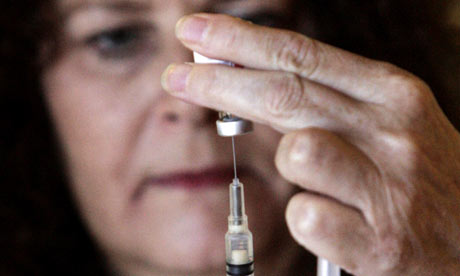
All healthy schoolchildren may be vaccinated against swine flu, the Department of Health revealed today, as it issued guidance on how to help pregnant women who catch the infection.
Confirmation that the government is considering extending the vaccination programme came as the Conservatives called for all pupils to be immunised against the H1N1 virus.
Cases of the disease in England increased only marginally this week to 84,000, according to official estimates. The latest figures show 154 people have died from swine flu – 105 in England, eight in Wales, 31 in Scotland and 10 in Northern Ireland. Seventeen people have died in the UK in the past week.
The chief medical officer, Sir Liam Donaldson, confirmed the government's Joint Committee on Vaccination and Immunisation is examining whether to extend the vaccination programme.
Healthy children are not among the priority groups in the first round of vaccinations. "We would hope to take a decision on [inoculating them] in the next few weeks," he said. "We are looking very hard at the next steps. We will have to work out whether any groups in the healthy population will have to be prioritised."
The Tory health spokesman, Andrew Lansley, proposed a universal schools vaccination programme. "For weeks now, behind the scenes," he said, "I have urged the government to go further: they should extend the vaccination programme to schoolchildren and college students.
"Last week in America I met swine flu experts at the Health and Human Services Department. Their data shows the incidence and severity of swine flu is significantly greater in the under-24 age group, compared to the rest of the healthy population. They have called all young people for vaccination, including a school-located vaccination programme. I think we should follow their lead."
The Department of Health said the US had so far left it up to individual states to determine what they believed were the priority groups deserving protection.
Its new advice to help doctors recognise serious symptoms in pregnant women has been released, suggesting those with high heart rates or shortness of breath when first infected are most at risk of serious illness or death.
The guidance notes that: "Pregnant women have been noted to have a four times higher risk of being hospitalised for complications compared to the non-pregnant population."
The new guidance also notes that: "The mortality rate for all hospitalised adults is approximately 6%" – a stark figure suggesting that a significant proportion of those admitted for treatment will die.
A Department of Health spokesman added: "The chief medical officer has already announced that the vaccine programme will be extended – we will announce details shortly."

